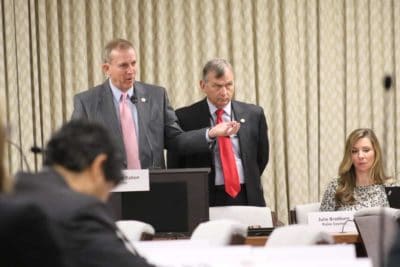
The Mary Reynolds Babcock Foundation has joined what it acknowledges is a “highly unusual” effort by philanthropies to influence a decision by the U.S. Supreme Court. The Winston-Salem-based foundation is among 30 philanthropic organizations nationwide that have filed a brief opposing the Trump administration’s attempt to insert a disingenuous citizenship question into the 2020 Census.
The foundations tell the justices of their deep concern that the proposed citizenship question will strike fear in households consisting of both citizens and undocumented residents and thus lead to an inaccurate population profile of the nation. An undercount, they argue, would especially affect people and communities they serve.
“In the South, where the Babcock Foundation works, many communities are deemed hard to count, particularly children, people of color, low-wealth individuals, immigrants, Native American communities and rural populations,” says the MRFB blog explaining its joining in the amicus brief. “The addition of a citizenship question is likely to exacerbate the undercount of those communities, thereby diluting their political voices. Undercounting communities of color opens the door to racial gerrymandering, further diminishing representation of already disenfranchised groups.”
Coincidentally at the same time the foundations filed their brief, Carolina Demography, a unit of the UNC Population Center, released a blog and a map to identify North Carolina’s hard-to-count communities, not exclusively rural or urban. Carolina Demography does not deal specifically with the legal challenge to a citizenship question, but it points out that “certain populations have historically been undercounted in the census, due to a variety of factors.”
Carolina Demography identifies those populations as children under 6 and renters as well as black, Hispanic, and American Indian households. A new factor in the 2020 census — that much of the data will be collected online — has raised concerns about reaching people who live outside the reach of internet connections.
In the blog, Rebecca Tippett, director of Carolina Demography, offers a vivid explication of the value of as accurate a census count as possible. “When we talk about the importance of the Census,” she says, “we often talk about power and money. We use the census counts to distribute political power and allocate funding for everything from highway spending to programs like Medicare and Head Start.
“But the Census is more than just that. It is the backbone of virtually every data product researchers, governments, and businesses use to understand who we are, how we’ve changed, and what this might mean for the future. It’s also the most democratic and inclusive activity we do as a country.”
In their amicus brief, the foundations cite examples of how various philanthropies use census data to address the well-being of families and children, to track determinants of health, to monitor movement toward increasing educational attainment and, specifically referring to the Mary Reynolds Babcock Foundation, to support community development financial institutions.
For its part, the Trump administration says it seeks a citizenship question to assist in enforcing voting rights. And yet the Census Bureau has not asked a citizenship question since 1950 without weakening enforcement by federal courts and agencies. A proposed citizenship question seems aligned more with President Trump’s obsession over immigration through the southern border.
So heated has the president made the issue that it’s surely understandable that many Spanish-speaking households would refrain from responding to the census for fear of detention or deportation of family members. In legal not political language, the foundations add their voice to the chorus of concern that the 2020 census would produce an undercount, and therefore distort a demographic picture of the United States.
Of course, the profile of the inhabitants of the United States is depicted in novels and poetry, through history, sociology and journalism, in the stories of people, their neighborhoods and communities. Census data, rooted in a robust count, are important not only for political and utilitarian purposes but also for enriching Americans’ understanding and appreciation of their multi-faceted nation.
Addendum: The Census Bureau offers online educational resources for school teachers and students. Here are two links:


